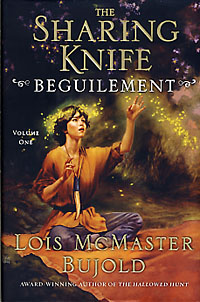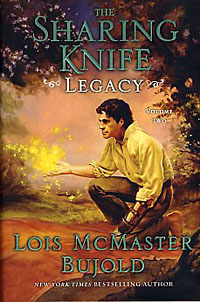
 One of the joys of a book by Lois McMaster Bujold, like a film by George Lucas, is that, once you’ve seen/read it through once or twice for the story, you can then start peering into the corners of the screen for all the lovely details. While The Sharing Knife, or at least the first 2 volumes, will probably not replace Barrayar and The Paladin of Souls in my list of favourites, the more I think about it, the more I find, and the more I find, the more I appreciate how the details of the worldbuilding undercut the apparently simple story and give the novels their elegaic feel.
One of the joys of a book by Lois McMaster Bujold, like a film by George Lucas, is that, once you’ve seen/read it through once or twice for the story, you can then start peering into the corners of the screen for all the lovely details. While The Sharing Knife, or at least the first 2 volumes, will probably not replace Barrayar and The Paladin of Souls in my list of favourites, the more I think about it, the more I find, and the more I find, the more I appreciate how the details of the worldbuilding undercut the apparently simple story and give the novels their elegaic feel.
To those who have not yet run across a review, Beguilement begins with an eighteen-year-old girl, Fawn Bluefield, in a very traditional fix, albeit for a reason entirely congruent with her character. She has fled her family farm and is heading, on foot, to a large town, to begin a new life. She is snatched from her road by the servants of a malice – a relict of a long-ago act of hubris by a powerful mage-king – and rescued by Dag Redwing Hickory, whose people, the Lakewalkers, have dedicated their lives to the slaying of malices as they appear. Between them, Fawn and Dag bring down the malice, but in such a way that they are bound together, and very shortly begin to fall in love. They’re an unlikely pairing, the naieve but clever young girl and the scarred, grim veteran three times her age. (And if you’re strongly averse to spoilers, do please go and read the book now, and then come back, because I can’t discuss details without getting into detail, though I try to tread lightly).
It’s-just-a-romance has been the tenor of some of the commentary on the novel, romance being generally disrespected. But this romance, and this is where the details come in, isn’t just-a-romance: it strikes at the very survival of the Lakewalkers, in particular. For the Lakewalker magic, the powers that allow them to slay malices, is inherited, and as Dag’s brother is not slow to point out, that means that at best Dag and Fawn’s children will inherit a half-portion of his considerable powers. They have strong prohibitions on intermarriage, and in reaction, Fawn’s people, called (disparagingly) farmers by the Lakewalkers, have developed their own prejudices. As Dag’s aunt Mari says, Lakewalkers have two duties: to kill malices, and to give birth to the next generation able to do the same. And because of the nature of their magic, for each malice killed, a Lakewalker has to die, even if not at the same moment. Their hope of victory resides in, as Dag reflects, running out of malices before they run out of Lakewalkers.
And the details, those lovely details, suggest that the Lakewalkers may be losing their war. Dag’s seniority puts him in contact – and conflict – with the patrol leaders, whose constant theme is how strained their resources are, how slender their reserves of manpower. Lakewalkers’ traditional means of finding malices involves walking in search patterns, designed for a certain number of men and women, now being walked by fewer. The great losses of Dag’s life occurred when a malice slipped through the search-patterns, twenty years ago. Whether because of their own declining numbers, or because of their expanding territories – as farmers push into new territory – the Lakewalkers are overextended. And any delay in finding a malice increases its dangerousness, since by consuming living creatures, including men, it learns and grows. During Legacy, Dag finds himself confronting a malice more highly developed than any he’s seen before, and is struck by its beauty, its realization, and its deadliness. Shortly thereafter, he falls victim to a new form of malice-magic, devised by a malice that has absorbed Lakewalker knowledge into itself. Malices learn – albeit only as individuals. Lakewalkers do not, as Dag acknowledges ruefully, when taken by surprise by one of Fawn’s inspirations. He thought he knew what he was doing, he says, but it may be that he was only doing the same thing, over and over.
It’s not circumstance that Fawn is the innovator. She’s farmer-born, and farmers have grown beyond their purely agrigarian roots and are continuing to develop technologically while Lakewalkers remain static. Part of that is Lakewalker dedication of resources towards their long war, but another part is their aversion to doing anything at all that might call a likeness to their mage ancestors, whose hubris ruined the world. That includes building permanent structures, practicing agriculture, or trying to enlist the support of the farmers they protect to extend their own resources. To Fawn’s eye, their lives are materially impoverished, and their diet – heavily dependent on the ubiquitous plunkin – monotonous. A farmer craftsman was responsible for Dag’s essential arm-harness. Dag’s fine wedding shirt, woven by Fawn’s blind aunt, is an object of covert fascination to the Lakewalker councilwomen (lovely detail). Farmers are responsible for the growth of towns, for agriculture, for glassmaking, and leatherwork. But, another undercutting, their concentration in towns and their skills and innovations, makes their vulnerability to the malices dangerous both to themselves and the Lakewalkers.
So all of this challenges the unquestioning validation of the relationship that a conventional romance offers, with the elegaic sense of a world threatened and in decline. Dag and Fawn are not the first Lakewalker-farmer pairing, but all the others they hear of have been driven apart. It’s more than simple prejudice, and convention, it’s the survival of their world that’s at stake. If one couple are allowed to stay together, the argument goes, how many others will follow suit. To anyone who’s thinking that LMB wouldn’t play it that way, I’ll ask: Who is proven right about the sharing knife? What does that say about the integrity of the world and its peoples’ understanding of it?
Can the two of them make a difference? Fawn at one point asserts, defiantly, that it’s not having the right answer that matter, it’s asking the right question. Her right question leads to a lifesaving action, although not for the reason that she, or the reader expect. Fawn is bright, innovative and learning, and Dag’s powers are expanding. Another undercutting: he is thoroughly spooked by the new manifestations, as are the people around him, fearing that it is too close to the magic practiced by the mages who ruined the world. He lives in a static, circumscribed, and defensive world. And so, as Fawn had to leave a family who undervalued her, Dag arrives at his own point of departure. Which gives the ending of the two books an agreeable symmetry and sets up books three and four.